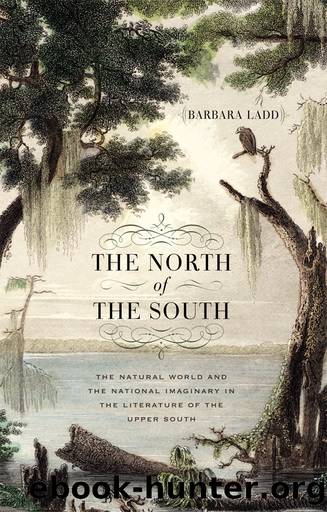The North of the South: The Natural World and the National Imaginary in the Literature of the Upper South by Barbara Ladd

Author:Barbara Ladd
Language: eng
Format: epub
Publisher: The University of Georgia Press
Published: 2022-12-15T00:00:00+00:00
CHAPTER THREE
Backwater
Westering
I used to think backwater meant
Remote or backward, out of date,
a place of stagnant poverty.
But found the term in history meant
across the mountain watershed
where rivers run the other way
to west to wilderness, to where
the future waits to open out
its shining promise, destiny.
Backwater meant new water then,
where greatness waited tilted toward
the sunset rivers of hope where
the worst of us, the very worst
of all, might find a seventh chance.
âROBERT MORGAN, âBACKWATERâ
This powerful poem by the North Carolina poet Robert Morgan embeds hope in melancholy. Contrary to nationalist mythmaking, narratives of westering are as likely to record melancholy stories of loss and failureâsuggested here in the imagery of âsunset rivers,â âmight,â and âseventh chanceââas they are to record the âshining promiseâ of hope.
In the previous chapter I explored the Virginia origins of Poeâs melancholy natural world of swamps, storms, mountains, cliffs, forests, waterfalls, and gorgesâthe dizzying height and deep abyss of his mindscape as a conversation with, and troubling of, the New World optimism of the Revolutionary era, represented by Thomas Jefferson.
In this chapter Iâd like to pick up on the troubling of New World optimism and look a little more closely at westering in the work of Elizabeth Madox Roberts, Cormac McCarthy (briefly), and Toni Morrison. All are writers of âthe North of the South,â if in different ways. Roberts is from a Kentucky family, while McCarthy comes from Rhode Islanders who moved to Tennessee to work with the Tennessee Valley Authority. Morrison was born in Ohio, but her parents were from the Deep South (her mother was from Alabama and her father was from Georgia). Her imagined world, wherever it is geographically, is always âSouth,â if by that we can mean that it is shaped by, colored by, and fundamentally inseparable from the region we know as the U.S. South. The natural world is central in the work of all three writers, and all engage with âwesteringâ in the predominant mode of melancholy.
In the 1820s, Captain Basil Hall toured the United States. While in South Carolina, he visited an orphan asylum:
While looking at this Orphan Asylum, my attention was called to some curious features of American society, which contra-distinguish it from that of old countries. All the world in that busy land is more or less on the move, and as the whole community is made up of units, amongst which there is little of the principle of cohesion, they are perpetually dropping out of one anotherâs sight, in the wide field over which they are scattered. Even the connexions of the same family are soon lost sight ofâthe children glide away from their parents, long before their manhood ripens;âbrothers and sisters stream off to the right and left, mutually forgetting one another, and being forgotten by their families. (165â66)
So much for the famous southern sense of place, sense of family, depth of memory. If we believe him, the national reality, even in South Carolina, where Hall made these observations in the early years of the Republic, seems to have been forgetfulness, loss of place, loss of memory.
Download
This site does not store any files on its server. We only index and link to content provided by other sites. Please contact the content providers to delete copyright contents if any and email us, we'll remove relevant links or contents immediately.
The Power of Myth by Joseph Campbell & Bill Moyers(1058)
Half Moon Bay by Jonathan Kellerman & Jesse Kellerman(979)
Inseparable by Emma Donoghue(976)
A Social History of the Media by Peter Burke & Peter Burke(976)
The Nets of Modernism: Henry James, Virginia Woolf, James Joyce, and Sigmund Freud by Maud Ellmann(900)
The Spike by Mark Humphries;(809)
The Complete Correspondence 1928-1940 by Theodor W. Adorno & Walter Benjamin(783)
A Theory of Narrative Drawing by Simon Grennan(775)
Culture by Terry Eagleton(771)
Ideology by Eagleton Terry;(733)
World Philology by(712)
Farnsworth's Classical English Rhetoric by Ward Farnsworth(711)
Bodies from the Library 3 by Tony Medawar(708)
Game of Thrones and Philosophy by William Irwin(707)
High Albania by M. Edith Durham(699)
Adam Smith by Jonathan Conlin(687)
A Reader’s Companion to J. D. Salinger’s The Catcher in the Rye by Peter Beidler(686)
Comic Genius: Portraits of Funny People by(649)
Monkey King by Wu Cheng'en(647)
